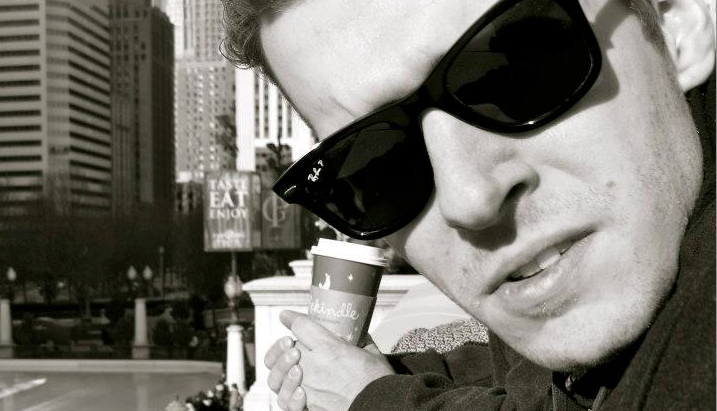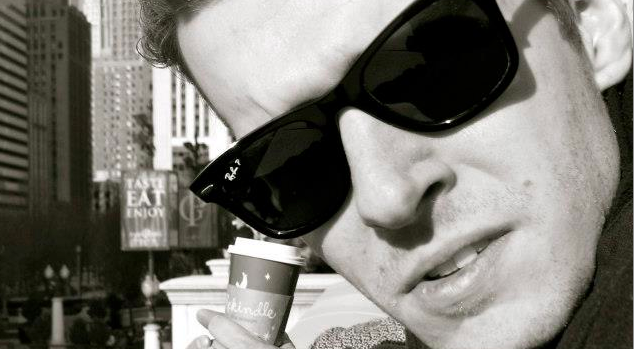
Beau Brokop and I first met at a mobile and social gaming company in the Madison area where I had accepted a marketing position. I came to learn that, as a graduate of the American Academy of Art in Chicago, Beau had already directed a number of his own films including several music videos and animated shorts. I couldn’t help but notice something about him was different, even pensive, as if he could talk to me and be thinking hard about something else at the same time. It also helped that I’d already seen a strong voice in his video game artwork, hints of a unique style and point of view.
Curious about what it might take to break into the film industry and where one might start, I sat down with Beau and asked him about his personal experiences with film and his future aspirations.
LakeFrontRow: When did filmmaking change from ‘hobby’ to something more serious?
Beau Brokop: I really got into it kind of late because I didn’t know I wanted to do anything with film. I was more into video games and concept art. It wasn’t until my sophomore year of college, when I was required to take a video class, that I thought about filmmaking as something I would enjoy. I learned how to edit and really liked it. Then in my junior year of college, I started working on some bigger and more personal projects. Turns out, a lot of people liked [what I did]. I made an animated short film for a song that I liked. My professor really enjoyed it, and I got more recognition through film than I did with my traditional art.
LFR: So when did you first decide to pursue a filmmaking career?
BB: [That first film] got me in touch with an artist, Phil Hale, who lives in London and is a guy I really look up to. Even though he doesn’t pursue film much, (he’s a painter by nature), he contacted me after that first short, and I realized this was going to open a door for me.
I started working on another short film that was like my original film: a stop-motion, 2D, comic-style animation. I wanted to make a continuation of that first video but push the concept further, so I started working on that in my spare time. That eventually got pushed by the wayside when I got back in touch with Phil. He wanted me to do a video for him for London’s Fashion Week. So then that took over.
With my current job [as a video game artist], I sit around for 8 hours at a computer. But I don’t want to be doing this for the rest of my life. I like to be physical, so when I approach art, it’s from a traditional mindset.
LFR: Do you see yourself working in other genres?
BB: I would like to direct animated films and definitely live action. Using real people like in the last film I made, I really enjoyed doing that. I want to take that and wrestle with it, because a lot of my work has been animated. I have the means to do it. I just have to get out there.
LFR: So how do you finance your projects?
BB: I’ve slowly been gathering equipment. Right now I have a camera and some sound equipment. “Slowly but surely” is the only answer. I try to think of ideas in a way that will work in relation with the tools available. That’s why I try not to go “too grand” [with my ideas]. It’s a great challenge to make something that’s very real with what I have right now, rather than being grandiose with effects.
LFR: What inspires you to come up with a concept?
BB: Music is definitely key. I’ll be listening to a song and picture a video that might go with it. As I continue to work on my own personal films, I’m not sure [a single song] is the best way to think about it. Maybe there should be more to it.
Most of my ideas will start with a song, but I never try and stick with one idea. I keep it organic so that when I’m writing I can take more and more from [the process]. My latest film (“Already”) began from the idea of a couple that solves their problems by playing Russian Roulette, which fit nicely with the Hammock song (“Take a Drink From My Hands).
LFR: Do you think a director’s work gets affected by success?
BB: Part of me would love to make a big, epic action flick, but a lot of my favorite directors — Martin Scorcese and Quentin Tarantino — don’t always go over the top. At the same time, they still manage to blow peoples’ minds. Nicolas Winding Refn [of Drive fame] and Paul Thomas Anderson can tell stories with relatively low budgets. Many of their stories don’t require lots of Hollywood special effects. And you can spot their films. It’s great that there are directors that go from nothing to something and could pull in these huge budgets [if they wanted] but don’t. They’re a lot more personal.
LFR: What limitations do you still have as a filmmaker?
BB: My personal limitations are skills that I just don’t have right now. I’m not adept enough in 3D or effects yet but that would be something that I would like to learn. Once I get the ball rolling, I’ll be able to do some bigger things, but I also think limitations in any art form are a good thing because it forces you to be more creative. I never want to take full advantage of everything I have. It can make a great idea a shit one if it becomes too flashy; it won’t pack the same punch. I guess the KISS principle [Keep It Simple Stupid] is really important to me.
Overall, I think it depends on what the director wants to do. Some directors like to run one camera, like Christopher Nolan. He likes to see everything [he shoots] and still uses film. Some directors like to sit back, say “action” and “cut,” and watch the story play out. I think at one point no director was ever just given everything, so he had to do everything himself. I would prefer to have as much control as possible. I like being involved. I love the editing and the cinematography. Since I come from a photography background, I look up to directors who want to be as involved as possible.
LFR: What are some qualities in yourself and others that make one suitable for film directing?
BB: Look at how you treat group projects in school. If you’re the kid that everyone looked at to be the leader, if you always stepped up, those are qualities necessary for directing. I always hated relying on other people for my grade. I like having complete creative control over what I’m doing. I don’t like working for people. If I’m creating something, [that creation] is an extension of me, and I want it to be good. Being hard-headed also helps.
LFR: What’s the best advice you could give someone new to filmmaking?
BB: I would say that you should look into photography, get yourself a camera, and just start shooting. Let it naturally build from there. Start thinking ‘What can I do next?’ You’ll discover what you can do with what you have and it will develop from there, building to that next step.
LFR: What would you tell young Beau who wasn’t sure what he was going to be when he grew up?
BB: To beg his parents to let him use their camera and start shooting. Art was the only thing I was good at. I discovered I was passionate about art because I loved video games and drawing and it developed into what I wanted to do for the rest of my life. I really didn’t know what I wanted to be until I took art classes in high school.
LFR: Do you think those classes were essential in the end, though?
BB: If you have a passion for film then just start doing it. Nothing beats hands-on experience. You’ll learn a lot about yourself. You’ll learn a way to do things that will make sense to you even if it doesn’t make sense to everyone else. I don’t think that you should go to school for it. Freshman year was the most important year in college for me because I learned the fundamentals, but for the most part, I don’t believe in art school.
I would recommend Rebel Without a Crew by Robert Rodriguez [Desperado]. It’s all about how he shot his first film, El Mariachi, when he was only 26. He and a friend shot it in the middle of Mexico for $3,000. You can’t say that you’re going to go work as a director; it’s just something that you are. You just have to go make films.
Beau lives in the Madison area where he works as a video game artist. He continues to make films.
You can find more of Beau’s work on his YouTube page and at BeauBrokop.com


1 Comment